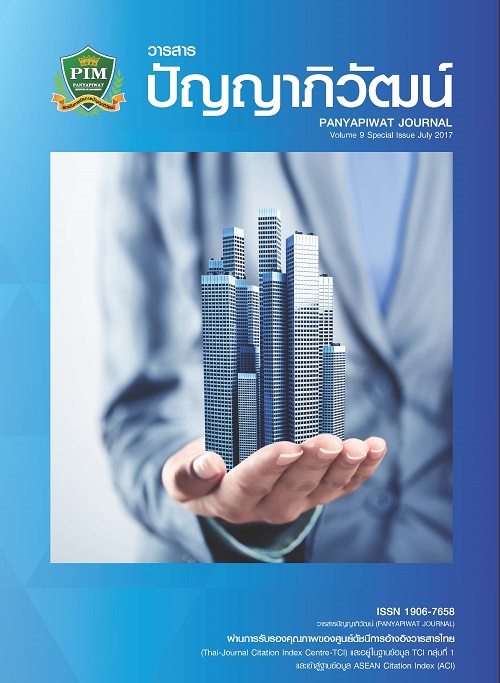องค์ประกอบของภาวะผู้นำครูเพื่อเสริมสร้างความก้าวหน้าทางวิชาชีพ ในโรงเรียนที่มีอัตราการแข่งขันสูง
Main Article Content
บทคัดย่อ
การวิจัยในครั้งนี้เป็นการวิจัยแบบผสมผสานวิธี วัตถุประสงค์ในการวิจัยครั้งนี้เพื่อสังเคราะห์แนวคิดและหลักการเกี่ยวกับองค์ประกอบของภาวะผู้นำครูเพื่อเสริมสร้างความก้าวหน้าทางวิชาชีพในโรงเรียนที่มีอัตราการแข่งขันสูง เครื่องมือที่ใช้ในการวิจัยคือ แบบสอบถามและแบบสัมภาษณ์ เก็บรวบรวมข้อมูลจากผู้มีส่วนได้ส่วนเสีย ประกอบด้วยผู้อำนวยการ รองผู้อำนวยการ และครู จำนวน 150 ท่าน การสัมภาษณ์แบบเชิงลึกจากผู้ทรงคุณวุฒิทางด้านการศึกษาและนักวิชาการ จำนวน 5 ท่าน ตรวจสอบข้อมูลแบบสามเส้าและวิเคราะห์เชิงเนื้อหา
ผลการวิจัยพบว่า องค์ประกอบของภาวะผู้นำครูเพื่อเสริมสร้างความก้าวหน้าทางวิชาชีพในโรงเรียนที่มีอัตราการแข่งขันสูง ประกอบด้วย 6 ประการ ได้แก่ (1) ความมุ่งมั่นพัฒนาคุณภาพการศึกษาด้วยจิตวิญญาณ (2) ความสามารถในการนำการคิดอย่างสร้างสรรค์ (3) ความสามารถในการปฏิบัติงานอย่างมืออาชีพ (4) ความสามารถในการกำหนดอนาคตภาพอย่างมีวิสัยทัศน์ (5) ความสามารถในการสื่อสารอย่างสร้างสรรค์ และ (6) ความสามารถในการก้าวทันการเปลี่ยนแปลง
ผลการวิจัยเป็นองค์ประกอบเชิงพฤติกรรมที่สะท้อนถึงเจตคติ ค่านิยม ความรู้ ความสามารถ และทักษะที่จำเป็นสำหรับการยกระดับการพัฒนาครูเชิงคุณภาพ มุ่งเน้นการพัฒนาสมรรถนะหลักและสมรรถนะประจำสายงานตามที่กระทรวงศึกษาธิการกำหนด สอดคล้องกับแนวทางการพัฒนาสมรรถนะการบริหารทรัพยากรบุคคลแนวใหม่ภาครัฐของสำนักงานคณะกรรมการข้าราชการพลเรือน ตลอดจนการพัฒนาทางวิชาชีพของครูที่มุ่งเน้นด้านภาวะผู้นำครูเพื่อเสริมสร้างความก้าวหน้าทางวิชาชีพอย่างมีประสิทธิผลและสร้างครูผู้นำการศึกษาไทย
The study was a mixed method research with the objective to synthesize concept and principle of components of teacher leadership for strengthening professional growth in high competitive school. The research instruments were an questionnaire and an interview form. Data were collected by stakeholders; principals, vice-principals, and teachers. The in-dept interviews were collected by educational experts and scholars. Content analysis was used to analyze the data by the methodological triangulation.
The research finding showed that six components of teacher leadership for strengthening professional growth in high competitive rate school were (1) spiritual committing of quality development; (2) leading creative thinking; (3) professional performing; (4) identifying visionary scenario; (5) creating creative communication; and (6) keeping the pace of change.
The study results were the behavior components of attitudes, values, abilities and skills which were necessarily for enhancing the quality of teacher development. Focusing on core competency and functional competency as regulation of the Teachers Council of Thailand on professional standards and ethics, Ministry of Education. Moreover, the professional development focused on the teacher leadership development raised the professional growth effectively and strengthened teacher leaders in Thailand.
Article Details
“ข้าพเจ้าและผู้เขียนร่วม (ถ้ามี) ขอรับรองว่า บทความที่เสนอมานี้ยังไม่เคยได้รับการตีพิมพ์และไม่ได้อยู่ระหว่างกระบวนการพิจารณาลงตีพิมพ์ในวารสารหรือแหล่งเผยแพร่อื่นใด ข้าพเจ้าและผู้เขียนร่วมยอมรับหลักเกณฑ์การพิจารณาต้นฉบับ ทั้งยินยอมให้กองบรรณาธิการมีสิทธิ์พิจารณาและตรวจแก้ต้นฉบับได้ตามที่เห็นสมควร พร้อมนี้ขอมอบลิขสิทธิ์บทความที่ได้รับการตีพิมพ์ให้แก่สถาบันการจัดการปัญญาภิวัฒน์หากมีการฟ้องร้องเรื่องการละเมิดลิขสิทธิ์เกี่ยวกับภาพ กราฟ ข้อความส่วนใดส่วนหนึ่งและ/หรือข้อคิดเห็นที่ปรากฏในบทความข้าพเจ้าและผู้เขียนร่วมยินยอมรับผิดชอบแต่เพียงฝ่ายเดียว”
เอกสารอ้างอิง
Bellanca, J. & Brandt, R. (2010). 21st century skills: Rethinking How Students Learn. USA: Solution Tree Press.
Center for Teaching Quality. (2014). The teacher leadership competencies. USA: Carrboro, North Carolina.
Danielson, C. (2006). Teacher leadership that strengthens professional practice. Alexandria, VA: Association for Supervision and Curriculum Development.
Dee, R. D., Henkin, A. B. & Duemer, L. (2002). Structural antecedents and psychological corelates of teacher empowerment. Journal of Educational Administration, 41(3), 257-277.
Frost, D. & Robert, A. (2009). Teacher leadership in action. Collaborative Action Research Network International Conference, Athens, Greece.
Goodson, I. F. & Hargreaves, A. (2003). Teachers’ Professional Lives. London: Falmer Press.Greenlee, B. J. (2007). Building Teacher Leadership Capacity through Educational Leadership Programs. Journal of Research for Educational Leaders, 4(1), 44-74.
Hipp, K. & Huffman, J. (2003). Professional Learning Communities: Assessment-Development-Effects.Paper presented at the meeting of the International Congress for School Effectiveness and Improvement, Sydney, Australia.
Intanam, N. (2010). Development of A Benchmark for Building Professional Learning Communities in Schools. Doctoral program in educational measurement and evaluation, Chulalongkorn University.[in Thai]
Kenoyer, F. E. (2012). Case study of professional learning community characteristics in an Egyptian private school. Dotorate’s Degree, Columbia International University.
Killion, J. & Harrison, C. (2006). Taking the lead: New roles for teachers and school-based coach-es. Oxford, OH: National Staff Development Council.
Leelahakorn, P., Ekpetch, C. & Charurnsuk, B.(2015). Teacher Leadership in Secondary Schools under The Office of the Basic Education Commission in Upper Southern Region. Journal of Education Thaksin University, 15(1), 95-100. [in Thai]
Mathews, L., Holt, C. & Arrambide, M. (2014). Factors Influencing the Establishment and Sustainability of Professional Learning Communities: the Teacher’s Perspective. International Journal of Business and Social Science, 5(11), 23-29.
Murphy, J. & Datnow, A. (2003). Leadership lessons from comprehensive school reforms. Retrieved January 20, 2017, from http://eric.ed.gov/ERICWebPortal/recordDetail?accno=ED472617
Murphy, J. (2005). Connecting teacher-leadership to school improvement. Thousand Oaks, CA: Corwin Press.
National Council for Curriculum Assessment (NCCA). (2009). Leading and supporting change in schools. Ireland: Dublin.
Office of National Education Standards and Quality Assessment. (2011). Manual for the Third Round of External Quality Assessment (2011-2015). Samutprakan: Offset Plus. [in Thai]
Office of the Basic Education Commission. (2010). Handbook of Teacher Competency Assessment (Edition 2010). n.p. [in Thai]
Prasongporn, P. (2007). Teacher with The Knowledge for English Pedagogy. Academic Journal, 10(3), 12-17. [in Thai]
Schools under The Office of The Basic Education Commission in Upper Southern Region.Journal of Education Thaksin University, 15(1), 95-110. [in Thai]
Sinlarat, P. (2014). Teacher in 21st Century. Academic Conference “Learning Revolution for Changing Thailand”. Quality Learning Foundation: IMPACT Arena 6 May 2014. [in Thai]
Toolsee, A. (2011). Teacher leadership: Theoretical Foundations in Educational Leadership and Management. Norderstedt, Germany: GRIN Verlag.
Trilling, B. & Fadel, C. (2009). 21st Century Skills: Learning for Life in Our Times. San Francisco, CA: John Wiley & Sons.
York-Barr, J. & Duke, K. (2004). What Do We Know About Teacher Leadership? Findings From Two Decades of Scholarship. Review of Educational Research, 74(3), 255-316.


